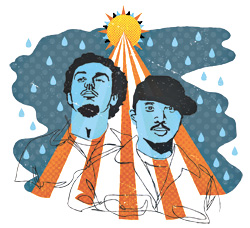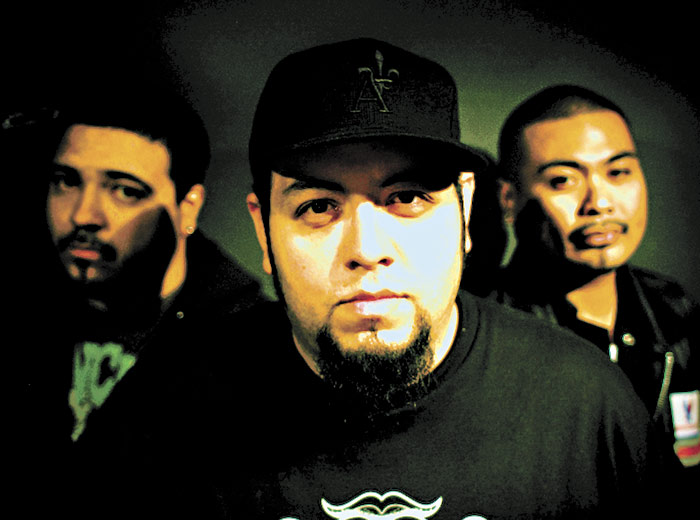The time was 1:35 p.m. two Mondays ago when news of a landmark record deal broke on the Internet. Local hip-hop group Blue Scholars, known for their quick-witted rhymes and common-man appeal, announced they’d brokered a deal in which New York hip-hop label Duck Down Records signed to them. Whether that’s the most accurate way to put it is debatable, but the message was clear: Blue Scholars were now a part of a larger movement that’s turning the record industry on its head by rejecting traditional record contracts in favor of far more unusual deals. Like numerous other artists such as Radiohead, Saul Williams, and Nine Inch Nails, Blue Scholars want to have more of a say in how their music is sold and the percentage of revenue they’re able to keep, and they’re taking an unorthodox approach to ensure that.
Rather than strike a traditional artist-label agreement, the duo, along with their manager, Dave Meinert, decided to hire Duck Down for marketing and distribution assistance for their next EP, OOF!, due out August 25, and for their upcoming full-length, which will drop sometime in 2010. Record labels don’t come cheap, so to pay for such an arrangement, Blue Scholars also struck a unique deal with local coffee company Caffé Vita, who have agreed to provide a revolving line of credit at a low interest rate in exchange for being part of a long-term branding association with the group.
The main reason bands still sign with labels in the first place is to utilize a label’s established infrastructure to help get their music to wider audiences. But this often comes at a heavy price. After investing a large sum in an artist’s development, labels typically keep the lion’s share of the profits once an album starts selling—in addition, bands often forfeit ownership of their own material and licensing opportunities, not to mention other complex business deals that aren’t in musicians’ best interests.
“Record labels can be very greedy,” says George “Geologic” Quibuyen, lead MC of Blue Scholars, while sipping an iced coffee from—where else?—Caffé Vita. “We’ve always been looking for a loophole out of that exploitative relationship. The bottom line is it costs money to produce and record an album. The traditional way is the label will front that, then recoup from the sales once the CD is done. With this one, we pay [the label] up front for what they do, and then keep a higher percentage of sales. Not to mention creative control, not to mention how our music is marketed and who it’s marketed to. That makes a big difference for us.”
According to Meinert, Blue Scholars initially spent part of 2009 chatting with various labels about signing a traditional record contract. They won’t name all their suitors, but Warner Bros. Records was reportedly one. But the parties were unable to see eye to eye. “A lot of [record] labels these days, they just don’t get it,” Meinert says. “The guys, they want to do a book of art about their songs. Plus the guys are really into video and film and want to do more multimedia stuff—and the labels didn’t get that either.”
Considering that Blue Scholars’ last album, 2007’s Bayani, released in conjunction with Rawkus Records, has sold more than 23,000 copies (with minimal assistance from that label), and that they have a wide regional fan base, the group felt they had enough clout to pursue other options.
“If you can do anything over 10,000 units sold, and you didn’t have much of a push, that’s really good,” says Drew “Dru Ha” Friedman, Duck Down’s co-founder. “To be honest, they didn’t totally need us. You have to have leverage on your side. Being able to sell 20,000 records independently, that gives you options. And options are key.”
As for the deal that was struck: Duck Down will use its established networks to market and distribute the next two Blue Scholars releases. Although OOF! will only be printed in a limited run of 808 copies (a play on the area code of Hawaii and the famed Roland TR 808 drum machine) and will be physically available mostly in Oahu, Duck Down will handle marketing the EP digitally. And on September 1, Duck Down will also re-release Bayani in the hopes of getting it into national retail outlets.
“This is the first time we’ve ever done anything like this,” Friedman continues. “Where the artist is structuring the deal, so that they are putting up the money, and keeping a higher percentage—that’s definitely unique.”
Friedman feels that this sort of deal is something more national bands are going to want to pursue in the future. But he cautions that it’s not as easy as it looks.
“They found a financier in [Caffé Vita], for starters,” he says. “You need to find a partner that’s willing and believes in you. You also have to get your buzz to a point where the entity is already on its way. A new artist might say ‘I want a record deal like that,’ but if you haven’t done anything to earn it, it’s not going to happen.”
Ian Rogers, CEO of Topspin Media in California, agrees that this is the next step in the growing trend of bands no longer relying on labels. “When you get an artist hiring a label instead of vice-versa, that’s definitely the shape of things to come. Rogers should know: While his company now creates software, such as widgets, to help bands market themselves independently, he previously ran Yahoo! Music and Grand Royal, the Beastie Boys’ label.
“This is a clear sign that bands don’t need the labels anymore to be successful,” Rogers says. “You’ve got bands like Metric that have songs on the radio, they’ve played Letterman, and they don’t have a label at all. They hired all of the people they need to make that happen.”
While this type of arrangement is unique locally (especially with Caffé Vita’s involvement), it’s not totally brand new. Indie bands already contract services in lieu of traditional artists/label deals. But it’s completely unheard of in hip-hop—as is getting a coffee company to act as your financier.
“It really came down to, how are we going to be able to do all this stuff that we want to do and have someone to pay for it?” says Saba “Sabzi” Mohajerjasbi, Blue Scholars’ producer. “And it was like, why do we have to work with a record label? Let’s find someone else. And Caffé Vita understands creative marketing like this, so it made sense.”
Caffé Vita founder Mike McConnell says this sort of venture isn’t entirely new for his company either. Vita has sponsored several artists before, assisting them in putting out their material, so he was glad to help when Meinert approached him.
“I like the idea of creating a lifestyle brand through coffee and music,” McConnell says. “Plus [we] just want to be able to help these guys and support ’em. We’ve been involved in music since ’95. Without naming names, we’ve done this maybe a half-a-dozen times and have been fortunate enough to make our money back on deals. They’ve got a lot of integrity, so we want to help the Blue Scholars get to the next level.”






